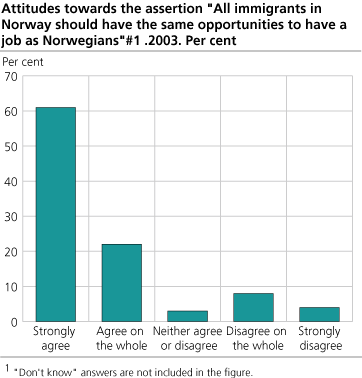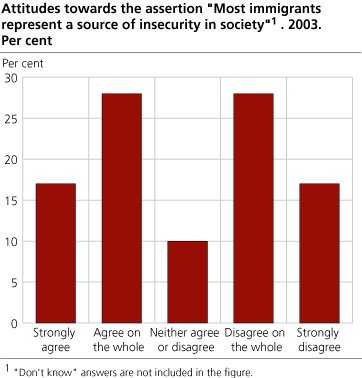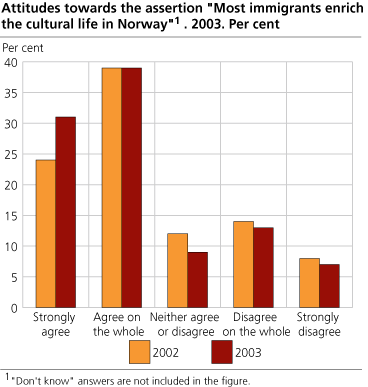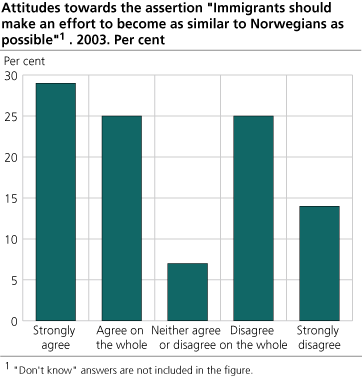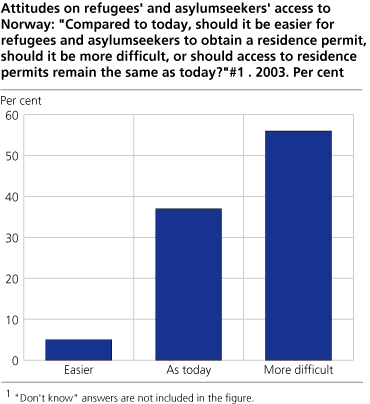Content
Published:
This is an archived release.
Xenophobia remains stable
Xenophobia is not on the rise in Norway. To the extent that attitudes towards immigrants and immigration have changed they have become more positive. Two thirds of the Norwegian population have contact with immigrants, and those who do are more immigrant friendly than others. Few people have negative experiences from having contact with immigrants.
83 per cent agree to the statement " All immigrants in Norway should have the same opportunities to have a job as Norwegians ". This statement gathered most positive answers. Two thirds of the population agree that " Most immigrants make an important contribution in the Norwegian work life ", and 70 per cent agree that immigrants enrich the cultural life in Norway.
The statement " Most immigrants abuse the system of social benefits " reveals greater differences in public opinion. 39 per cent agree that immigrants abuse the system of social benefits, while 48 per cent disagree. The following statement triggered the most immigrant-hostile answers: " Most immigrants represent a source of insecurity in society ". The population is divided on this question, as 45 per cent agree and 45 per cent disagree, while 11 per cent say they "Neither agree or disagree" or "Don't know".
The proportion that agree that " Most immigrants enrich the cultural life in Norway " increased from 63 per cent in last year's survey to 70 per cent in 2003. This probably represents a real change in attitudes. When it comes to answers to the other statements the changes are too small to be noteworthy.
A new question in this year's survey shows that 54 per cent agree that " Immigrants should make an effort to become as similar to Norwegians as possible ". Four out of ten disagree. 8 per cent say they "Neither agree or disagree" or "Don't know". In general, those who believe that immigrants should make an effort to become as similar to Norwegians as possible tend to have a hostile attitude towards immigrants in other questions as well. In a Swedish survey an even larger proportion believed that immigrants should adapt in this way.
Majority wants stricter immigration policy
A question about immigrants' admittance to Norway revealed that slightly more than half (56 per cent) believe that it should become more difficult to obtain a residence permit in Norway. This question gathered most negative answers. Only 5 per cent believe that the system should be made more lenient, while 37 per cent believe that the system should remain unchanged.
There is no marked change in opinion on this question from last year. In 2002, however, there was a marked change in attitudes compared to previous surveys. The proportion that would like stricter rules for reception of refugees increased by 20 percentage points from 2000 to 2002. However, reservations must be made with regard to differences in wording in the two surveys.
Nine out of ten positive to having immigrants as neighbours
Nine out of ten would not be reluctant to have an immigrant as a neighbour. Nine out of ten would not have anything against having an immigrant as a home help themselves or in the close family. 58 per cent would not be reluctant if their son or daughter wanted to marry an immigrant. This question reveals a significant change in attitudes from the previous year towards more tolerance.
Two thirds of the adult population have contact with immigrants. Place of work is the most common arena for contact, as four out of ten interact with immigrants in their work. Two out of ten have contact with immigrants in their neighbourhood, and three out of ten through friends and acquaintances. One out of ten has contact with immigrants among close relatives.
The questions on how often respondents have contact with immigrants and their experiences are new in the 2003 survey. A slight majority of the population have daily or weekly contact with immigrants. Of those who do have contact with immigrants, seven out of ten have positive experiences. Three out of ten say they have both positive and negative experiences, while only 1 per cent has negative experiences.
Attitudes vary with age, education and where people live
Age, level of education, place of residence and political attitude are important factors in determining attitudes towards immigrants and immigration. As shown earlier, positive attitudes towards immigrants and immigration increase with educational attainment. While for example 58 per cent of the population with primary or lower secondary education believe that immigrants abuse the system of social benefits, only 5 per cent of people with long tertiary education are of the same opinion. And while 70 per cent of people with primary or lower secondary education would like more restrictions on the admittance of refugees, the figure is 19 per cent for those with the highest educational attainment.
People in the highest age category (67-79 years) seem to be more hostile towards immigrants and immigration than younger people. This is partly related to differences in educational attainment in different age groups and the fact that young people have more contact with immigrants. People who interact with immigrants have a more positive attitude towards immigrants than others. There is also a correlation between the amount of contact (numbers of arenas) and a positive attitude towards immigrants.
In general, gender is of little importance when it comes to attitudes towards immigrants and immigration. In some questions, however, women reveal a more positive attitude towards immigrants than men. More women agree that immigrants enrich the cultural life in Norway, and they are less concerned that immigrants should become similar to Norwegians. People living in urban areas, and in the Oslo/Akershus area in particular, tend to have a more immigrant-friendly orientation than others. However, these differences are not substantial and can partly be attributed to differences in education and the fact that contact with immigrants is more common in urban areas around the capital.
These results are based on a new survey on attitudes towards immigrants and immigration among the Norwegian population. The questions are part of Statistics Norway's omnibus survey.
Tables:
- Table 1 Attitudes towards six assertions on immigrants. 2002 and 2003. Per cent
- Table 2 Attitudes towards the assertion 'All immigrants in Norway should have the same opportunities to have a job as Norwegians'. 1993-2000 and 2002-2003. Per cent
- Table 3 Attitudes towards refugees' access to the country. 2002 and 2003. Per cent
- Table 4 Answers to three questions on relation to immigrants. 2002 and 2003. Per cent
- Table 5 Contact with immigrants on different arenas. 2002. Per cent
- Table 6 Number of arenas where contact with immigrants takes place. 2002 and 2003. Per cent
- Table 7 Number of arenas where contact with immigrants takes place. 2003. Per cent
- Table 8 How frequently one has contact with immigrants. 2003. Per cent
- Table 9 Personal experience with contact with immigrants. 2003. Per cent
Contact
-
Frøydis Strøm
E-mail: froydis.strom@ssb.no
tel.: (+47) 40 81 13 17
-
Christian Sørlien Molstad
E-mail: christian.molstad@ssb.no
tel.: (+47) 46 65 99 12

